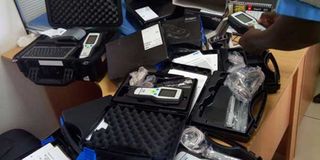NTSA to use new gadgets to nab drunk drivers

New gadgets acquired by NTSA in operations against drunk driving. PHOTO | COURTESY
What you need to know:
- Mr Meja has said 80 per cent of accidents in Kenyan roads are attributed to human behaviour.
- The NTSA boss said their operations have deterred many motorists from driving under the influence of alcohol.
The National Transport and Safety Authority (NTSA) will from Friday use its latest advanced breathalyser as it steps up war against drunk driving on Kenyan roads.
The gadgets give results faster and can capture more details about the driver than the previous ones.
NTSA Director General Francis Meja said they have acquired 50 new gadgets from the World Bank, and distributed them across the country.
“We intend to use them from tomorrow (Friday) during our random drink driving operation in towns and major highways,” he said adding that the gadgets will boost their evidence-based operations.
ROAD CRASHES
Since January, more than 1,762 people have died in road crashes, according to NTSA.
Mr Meja has said 80 per cent of accidents in Kenyan roads are attributed to human behaviour.
“Alcohol impairs a drivers cognitive ability turning them into a hazard on the road. It impairs vision, judgment sensory ability. All being critical aspects of safe driving,” he said.
The NTSA boss said their operations have deterred many motorists from driving under the influence of alcohol.
“We have noted a number of revellers opt to take a taxi rather than driving, which is very encouraging,” he said.
COURT
In April this year, beer lovers and bar owners got false reprieve after reports that the Court of Appeal had nullified use of alcoblows.
For the next few days, motorists, who had been arrested after failing alcoblow tests were released by magistrates due to the misinterpretation.
However, it later emerged that the Appellate Judges had ruled that it was illegal for motorists to be charged under the rules that operationalised the Traffic Act instead of the Act.
Put differently, the judges wanted offending motorists charged under the substantive Act itself and not the rules, meaning only the charges were defective and not the law as had been interpreted.
NTSA has since been charging drunk drivers under Section 44 (1) of the Traffic Act, which prohibits driving under the influence.





